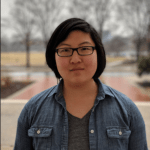This summer we are catching up with former volunteers and interns of the Bahá’í Chair. Our fourth post comes from Vicky Yu who graduated in 2018.
After undergoing a global pandemic, it sounds trite to say the world, and all its people, are connected. On an abstract level, I think most of us understood even before the resounding reminder. In fact, it’s so simple we often forget.
I began college as many freshmen do: too sure and unsure of myself all at once. While I knew I didn’t understand everything, I figured I understood what was worth knowing. I enjoyed learning, too (at least I savored the afterglow of knowledge), and held in the highest esteem books, statistics, experts.
Lo and behold, one of the most educational classes I took during my first semester came from a program unknown to me at the time — The Bahá’í Chair for World Peace — relied on no textbooks or numbers, and the teachers were other students. On days with class, between a dozen and twenty of us gathered around a cramped conference table in a too small room for hours. To do what?
Talk.
Each discussion centered on a topic, anything ranging from religion to poverty to gender, but beyond that, no agenda. Despite being predetermined, the conversations never felt inauthentic. Yes, we all shared similar core values, but people spoke freely, disagreed in good faith and offered different perspectives. Nothing ever devolved into a debate.
I’m guilty of this: the tendency to approach certain discussions intending to prove a point (that annoying person who played Devil’s Advocate? Me. I’ve matured out of the habit). However, Professor Mahmoudi fostered a space oriented for sharing rather than being right. In fact, she made herself as much a student as anyone. As someone entering the “real” adult world, being treated as an equal made all the difference.
We never solved anything in that room. I couldn’t distill a lesson the way I might after leaving a lecture on differential equations, nor could I name a topic where I underwent a radical shift in attitude. But none of that is the point.
The program was about perspective.
More than most classes, those open conversations helped me rediscover learning — not the kind rooted in pride but in curiosity. They also nurtured an appreciation for something absent in so many other interactions.
Within everyone there exists a need to feel heard, accepted, and understood. To feel valued independent of achievements or skill. Ultimately, to feel as if you matter.
It’s so simple we often forget; not only about ourselves, but each other.
Of course, I want to believe I always understood the intrinsic worth of other people. I didn’t sign up for a class about world peace from a place of no compassion, and even from a young age I was the first to volunteer around the classroom or to mentor others. Unfortunately, understanding something intellectually can fail to translate into knowing or feeling, much less living by those principles.
I’m admittedly Very Online, not always as an active participant, but an observer assimilating all the language, customs, attitudes. As a consequence, I’m more familiar with what strangers scattered across the world think than my own neighbors. At least, in theory.
There’s a common refrain that the internet brings out the best and worst of us, but often, the content only conjures mirages. So much of online “discourse” prioritizes speed and size and being right. Tidbits for a specific audience are stripped of context, flattened, then sensationalized. I’m not immune to the allure of reactive, catastrophic content. Schadenfreude feels fantastic. But the pleasure burns bright and fast; leaves little in its wake.
I find a steadier and more lasting comfort comes from engaging with the best in people. Some of my most gratifying memories include watching that spark ignite in someone’s eyes when they learn something new. When they understand.
True connections aren’t impossible online, but often require working against incentives. Understanding and being understood takes time, asking better questions rather than holding tight to answers, nuance. Not whitewashing bad but also not getting trapped in the mire of despair.
Like many, I spent the COVID-19 pandemic examining my choices and aspirations. As someone prone to pessimism (or at least realism), positivity often strikes me as futile or painfully naïve. Hope doesn’t come easy. People can be cruel, careless, so blinded by their own circumstances it becomes impossible to see other perspectives, much less treat them with any semblance of respect. Many wield justified cynicism. Too much needless suffering is held up as inevitability, or worse, valor.
I’m not under any illusion that a simple solution for the world’s problems exists. Empiricism matters; compassion alone isn’t enough. However, progress should build off a foundation which honors the dignity and agency in people, treats them with decency.
Whether it’s the work of some higher being or an uncaring universe, we’re here as we are — each of us with our unique constellation of quirks, strengths, scars, experiences — separate but not apart.
It’s so simple we often forget.
But with a little help, a little perspective, a little compassion, hopefully it isn’t too late to remember.
About the Author:
 Vicky Yu is a University of Maryland alumni who graduated with degrees in economics and statistics. These days, she’s a student of life doing her best to understand this imperfect world.
Vicky Yu is a University of Maryland alumni who graduated with degrees in economics and statistics. These days, she’s a student of life doing her best to understand this imperfect world.
